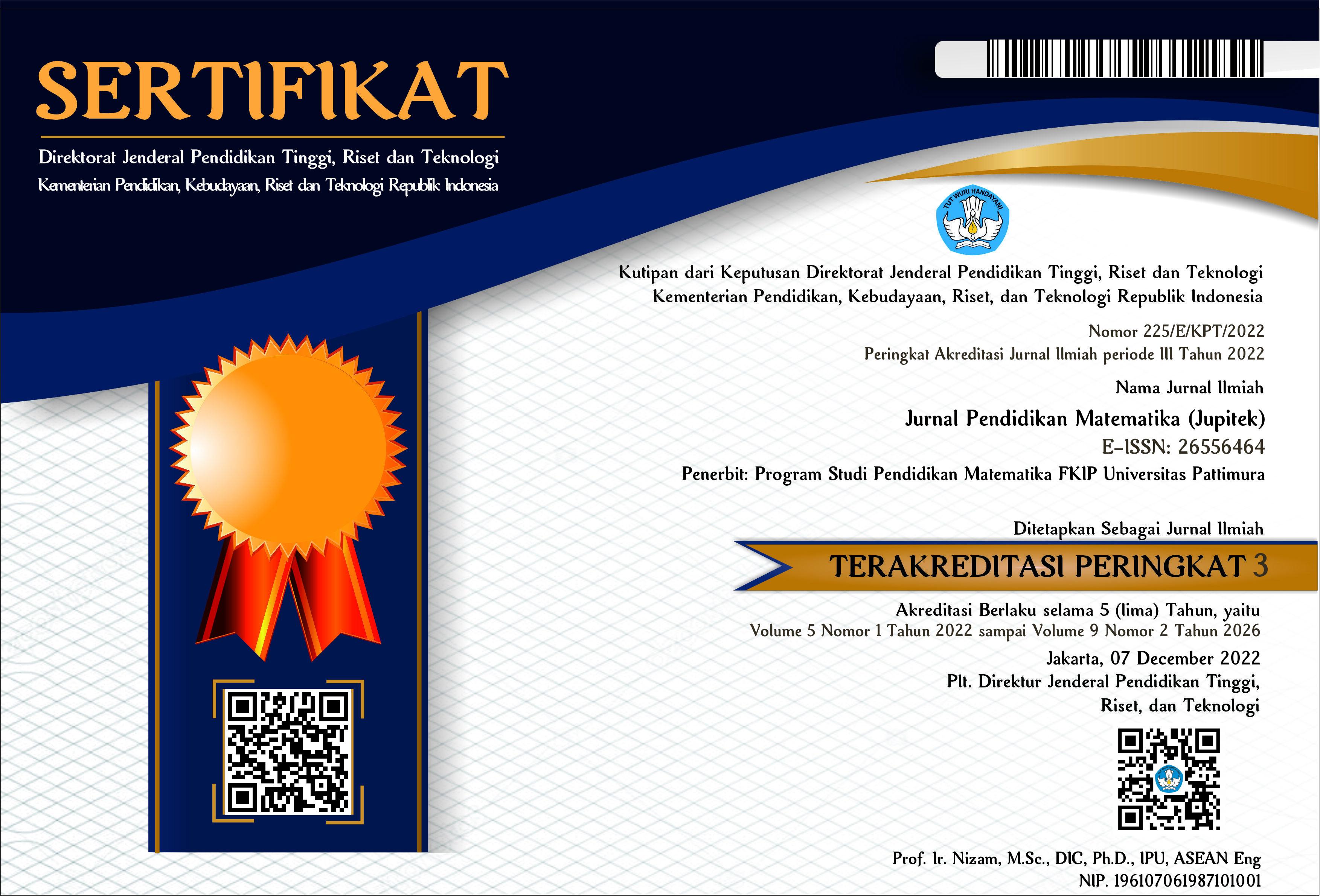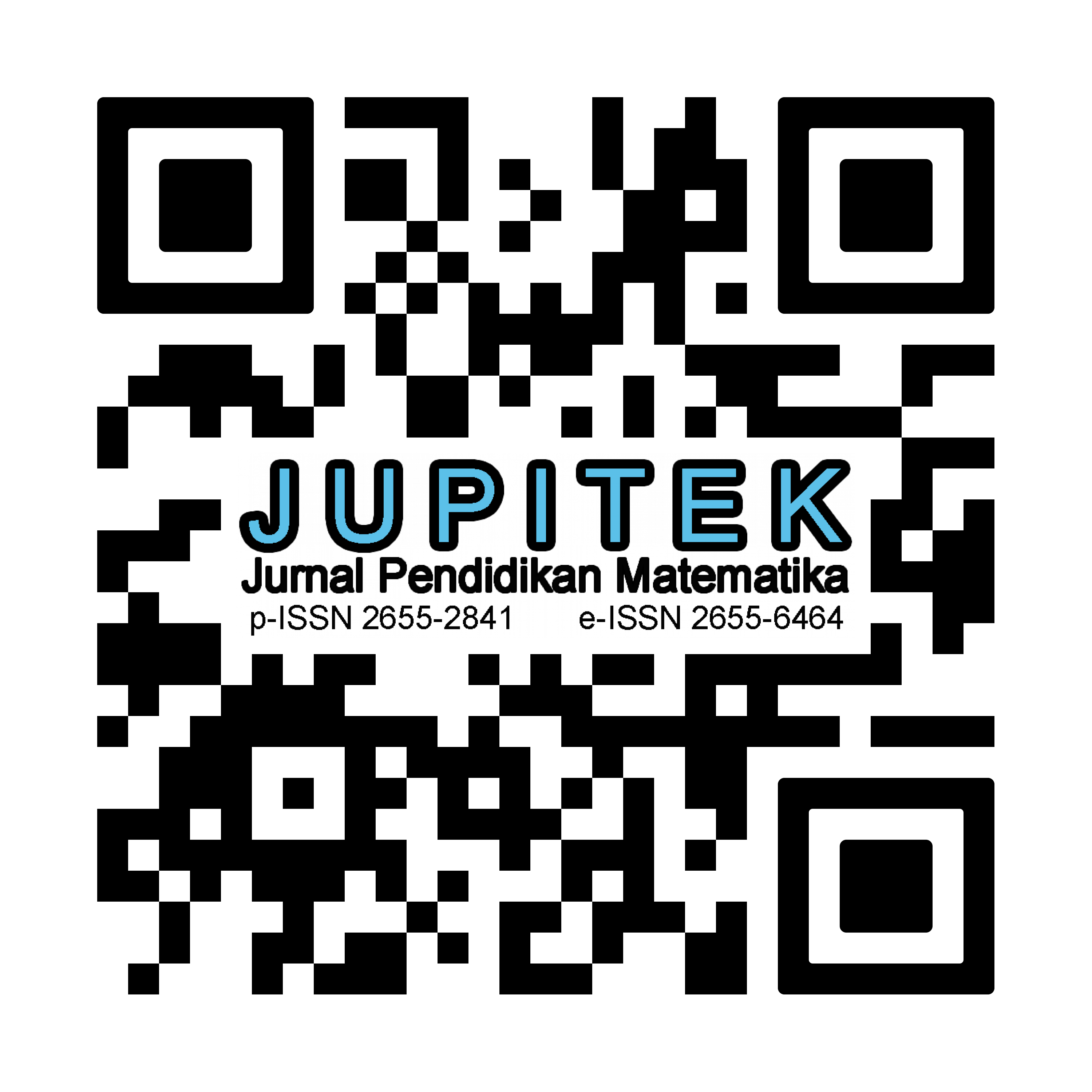PENERAPAN MODEL PEMBELAJARAN RME BERBASIS ETHNOMATEMATIKA UNTUK MENINGKATKAN KEMAMPUAN PEMECAHAN MASALAH MAHASISWA CALON GURU PENDIDIKAN MATEMATIKA FKIP UNIVERSITAS BENGKULU
Abstract
This study aims to apply the RME-based ethnomatematics learning model to improve problem solving skills of prospective mathematics education teachers at the University of Bengkulu. This research is Classroom Action Research (CAR) with data collection techniques through student observation sheets and learning outcomes tests. Subjects in this study were 2A semester students at the University of Bengkulu in the 2017/2018 school year, totaling 22 people consisting of 6 male students and 16 female students. This study lasted two cycles through the RME-based ethnomatematics learning model with the following phases (1) orienting students to problems; (2) organizing students to study; (3) assisting independent and group investigations; (4) develop and present artifacts (works); (5) process analysis and evaluation. Based on this research, it was concluded before the implementation of the Ethnomatematics-based RME learning model, pre-action tests were conducted which resulted in an average value of 69.00 after the implementation of the ethnomatematics-based RME learning model could improve students' mathematical problem-solving ability with the problem solving ability test results. mathematics students get an increase in the average value of the first cycle of 70.77 to the second cycle of 79.59 and the percentage of mathematical problem solving ability increased from the first cycle of 81.82% to the second cycle of 95.45%
Downloads
References
Arikunto, S. (2006). Prosedur Penelitian Suatu Pendekatan Praktek ( Edisi Revisi). Jakarta: Rineka Cipta.
Haji, S. (2008). Meningkatkan Kemampuan Pemecahan Masalah Melalui Pembelajaran Matematika Realistik di SMPN 1 Kota Bengkulu. Bengkulu: Universitas Bengkulu.
Hudojo, H. (1990). Strategi Belajar Mengajar Matematika. Malang: Ikip Malang, Perpustakan Nasional.
Kunandar. (2017). Langkah Mudah Penelitian Tindakan Kelas Sebagai Pengembangan Profesi Guru. Jakarta: RajawaliPers.
Putri, I. (2017). Eksplorasi Etnhomatematika Kesenian Rebana Sebagai Sumber Belajar Matematika Pada Jenjang MI. Jurnal Ilmiah Pendidikan Dasar, 4, 21-31.
Richardo, R. (2016). Peran Etnhomatematika Dalam Penerapan Pembelajaran Matematika Pada Kurikulum 2013. Jurnal Pendidikan Matematika, 118-125.
Soedjadi, R. (2000). Kiat Pendidikan Matematika di Indonesia. Jakarta: Direktorat Jenderal Pendidikan Tinggi, Departemen Pendidikan Nasional.
Wijaya, A. (2012). Pendidikan Matematika Realistik Suatu Alternatif Pendekatan Pembelajaran Matematika. Yogyakarta: Graha Ilmu.
Copyright (c) 2018 Ginta Octizasari, Saleh Haji

This work is licensed under a Creative Commons Attribution-NonCommercial-ShareAlike 4.0 International License.
License and Copyright Agreement
By submitting a manuscript to Jurnal Pendidikan Matematika (JUPITEK), the author(s) certify and agree to the following terms:
- Originality and Authority: The submitting author is authorized by all co-authors to enter into this agreement. The manuscript describes original work that has not been published previously in a peer-reviewed journal, nor is it under consideration for publication elsewhere.
- Approval: Its publication has been approved by all author(s) and by the responsible authorities of the institutions where the work was carried out.
- Rights: The authors secure the right to reproduce any material that has already been published or copyrighted elsewhere.
- Licensing and Copyright: Authors retain the copyright to their work.
- License Grant: The authors grant Jurnal Pendidikan Matematika (JUPITEK) the right of first publication, with the work simultaneously licensed under the Creative Commons Attribution-NonCommercial-ShareAlike 4.0 International (CC BY-NC-SA 4.0).
- Self-Archiving: Authors are permitted and encouraged to deposit the published version of their article in institutional repositories, on their personal websites, and other academic platforms, with proper acknowledgment of its initial publication in Jurnal Pendidikan Matematika (JUPITEK).






.png)


